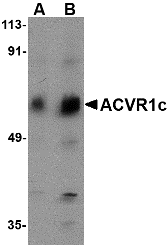Catalog#:4795
Activins are dimeric growth and differentiation factors which belong to the transforming growth factor-beta (TGF-beta) superfamily of structurally related signaling proteins. Activins signal through a heteromeric complex of receptor serine kinases which include at least two type I and two type II receptors. ACVR1C, also known as ALK7, is a type I activin receptor and plays a role in cell differentiation, growth arrest and apoptosis. ACVR1C can mediate signaling by ligans such as Nodal, GDF-1/3, activin B and activin AB, all of which can also signal through the ubiquitous activin type I receptor ACVR1B (also known as ALK4). ACVR1C is a novel marker specifically expressed during the late phase of adipocyte differentiation. ACVR1C is dispensable for mouse embryogenesis, which suggests alternative functions for this receptor in postnatal development and tissue homeostasis. ACVR1C plays an important role in regulating the functional plasticity of pancreatic islets, negatively affecting beta-cell function by mediating the effects of activin B on Ca2+ signaling. This antibody is predicted to have no cross-reactivity to ACVR1 or ACVR1B.
Additional Names: ACVR1C, Activin A receptor type IC, Activin receptor-like kinase 7, Activin receptor type 1C precursor, ACTR-IC, ACVRLK7, ALK7, ALK-7

Description
Left: Western blot analysis of ACVR1C in human placenta tissue lysate with ACVR1C antibody at (A) 1 and (B) 2 µg/ml.
Source:ACVR1C antibody was raised against a 15 amino acid peptide near the amino terminus of the human ACVR1C.
Purification: Affinity chromatography purified via peptide column
Clonality and Clone: This is a polyclonal antibody.
Host: ACVR1C antibody was raised in rabbit.
Please use anti-rabbit secondary antibodies.
Application: ACVR1C antibody can be used for detection of ACVR1C by Western blot at 1 µg/ml.
Tested Application(s): E, WB
Buffer: Antibody is supplied in PBS containing 0.02% sodium azide.
Blocking Peptide:Cat.No. 4795P - ACVR1C Peptide
Long-Term Storage: ACVR1C antibody can be stored at 4ºC, stable for one year. As with all antibodies care should be taken to avoid repeated freeze thaw cycles. Antibodies should not be exposed to prolonged high temperatures.
Positive Control:
1. Cat. No. 1309 - Human Placenta Lysate
Species Reactivity: H, M, R
GI Number: 4501895
Accession Number: NP_001096
Short Description: Activin A receptor type IC
References
1. Tsuchida K, Sawchenko PE, Nishikawa S, et al. Molecular cloning of a novel type I receptor serine/threonine kinase for the TGF beta superfamily from rat brain. Mol. Cell. Neurosci. 1996; 7:467–78.
2. Reissmann E, Jornvall H, Blokzijl A, et al. The orphan receptor ALK7 and the activin receptor ALK4 mediate signaling by nodal proteins during vertebrate development. Genes Dev. 2001; 15:2010–22.
3. Tsuchida K, Nakatani M, Yamakawa N, et al. Activin isoforms signal through type I receptor serine/threonine kinase ALK7. Mol. Cell Endocrinol. 2004; 220:59-65.
4. Kogame M, Matsuo S, Nakatani M, et al. ALK7 is a novel marker for adipocyte differentiation. J. Med. Invest. 2006; 53:238-45.

Description
Left: Western blot analysis of ACVR1C in human placenta tissue lysate with ACVR1C antibody at (A) 1 and (B) 2 µg/ml.
Source:ACVR1C antibody was raised against a 15 amino acid peptide near the amino terminus of the human ACVR1C.
Purification: Affinity chromatography purified via peptide column
Clonality and Clone: This is a polyclonal antibody.
Host: ACVR1C antibody was raised in rabbit.
Please use anti-rabbit secondary antibodies.
Application: ACVR1C antibody can be used for detection of ACVR1C by Western blot at 1 µg/ml.
Tested Application(s): E, WB
Buffer: Antibody is supplied in PBS containing 0.02% sodium azide.
Blocking Peptide:Cat.No. 4795P - ACVR1C Peptide
Long-Term Storage: ACVR1C antibody can be stored at 4ºC, stable for one year. As with all antibodies care should be taken to avoid repeated freeze thaw cycles. Antibodies should not be exposed to prolonged high temperatures.
Positive Control:
1. Cat. No. 1309 - Human Placenta Lysate
Species Reactivity: H, M, R
GI Number: 4501895
Accession Number: NP_001096
Short Description: Activin A receptor type IC
References
1. Tsuchida K, Sawchenko PE, Nishikawa S, et al. Molecular cloning of a novel type I receptor serine/threonine kinase for the TGF beta superfamily from rat brain. Mol. Cell. Neurosci. 1996; 7:467–78.
2. Reissmann E, Jornvall H, Blokzijl A, et al. The orphan receptor ALK7 and the activin receptor ALK4 mediate signaling by nodal proteins during vertebrate development. Genes Dev. 2001; 15:2010–22.
3. Tsuchida K, Nakatani M, Yamakawa N, et al. Activin isoforms signal through type I receptor serine/threonine kinase ALK7. Mol. Cell Endocrinol. 2004; 220:59-65.
4. Kogame M, Matsuo S, Nakatani M, et al. ALK7 is a novel marker for adipocyte differentiation. J. Med. Invest. 2006; 53:238-45.

1 comment:
Hi all,
ACVR1C plays an important role in regulating the functional plasticity of pancreatic islets, negatively affecting beta-cell function by mediating the effects of activin B on Ca2+ signaling. It is a novel marker specifically expressed during the late phase of adipocyte differentiation. Thanks a lot!
Post a Comment